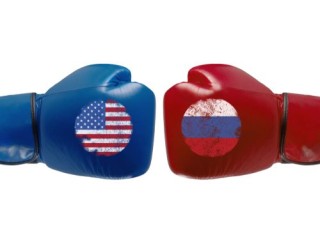What competition with China or Russia means for the US
Ahmad Abdel-Rahman explains why Washington DC has made competition with Beijing or Moscow its top priority.
Competition between the US, China or Russia is a top priority for the US Administration. A report published by the US Research and Development Corporation (RAND) said that since the US announced the its 2018 National Defense Strategy: "Strategic competition between states, not terrorism, is now the primary concern in US national security." No term has been more fashionable in defence policy circles than "competition". This has been the subject of a number of reports, memos, and public statements.
US President Joe Biden's first address to Congress included this term. The Biden administration's goal in the recently published Interim Strategic Guidance is to gain "predominance in strategic competition with China or any other country." At one level, there is good reason for the term's popularity, as the US is struggling for influence, competing with China and Russia in many parts of the world.
However, while strategic competition between states may be an accurate description of the international environment, it may not provide a good defence strategy, the report says. Competition between nations evokes images of sports matches or economic markets, but these competitions are bound by rules, judged by referees, and ultimately produce winners and losers. By contrast, geopolitical competition lacks
such clarity. There is no beginning, middle, or end, no rules, and no rulers.
The report says that as much as international relations theorists talk about competition, they use the term abstractly to describe how states are constantly vying with their peers for prestige, power, and security. Nevertheless, strategies need to be concrete and binding, rather than vague and descriptive. Competition, as an objective, provides none of these traits. While that determines who the US should compete with
(i.e. China and to a lesser extent Russia), where, how and why are left open. Above all, competition is a means, not an end. As such, it does not describe what the US wants to achieve. After all, China and Russia are big and powerful countries and no matter what the US military does, that will not change.
The focus on competition precludes making difficult but necessary choices about where the Department of Defense should allocate its resources. Although China and Russia are global powers, with a presence in one form or another in almost every corner of the world, not all of this influence threatens US national security to the same extent.
The report states that competition has no defined tasks, and the Department of Defense has interpreted competition as everything less than actual conflict. Some of these tasks, such as deterring Chinese and Russian aggression, fall directly into the military track, but others are arguably more appropriate for other parts of the US government. For example, the State Department, the US Agency for International Development, and civil society organisations might be better at countering Chinese Belt and Road investments, negating Russian influence operations, or exposing the two powers' attempts at political subversion.
In this sense, the military's directing of competition undermines the Biden administration's pledge to "elevate diplomacy as a tool of our first resort" .The report asks: "What should the Department of Defense do in peacetime if it is not competing with China and Russia? The report answers that, simply, it should prepare to win the next war, while defeating any military aggression. This necessity should direct the capabilities that the force develops what training it does, how it works, and with whom the US develops military relations.
By developing credible military options, the US may be able to deter China and Russia from using force to change the status quo. Above all, the report concludes that if the US military focuses on preparing for the next war, it may also achieve what Defense Secretary Lloyd Austin calls the cornerstone of American defense: ensuring that it never has to go to war. By developing credible military options, America may be able to deter Russia and China from using force to change the status quo.


Comments